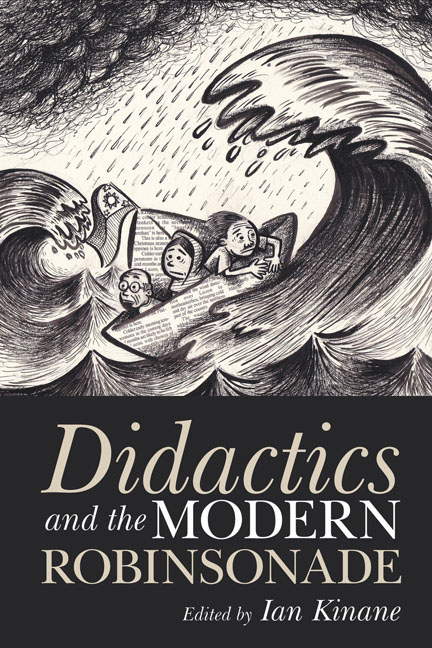Book contents
- Frontmatter
- Dedication
- Contents
- Notes on Contributors
- Foreword: The Progressive Pedagogies of the Modern Robinsonade
- Introduction: The Robinsonade Genre and the Didactic Impulse: A Reassessment
- 1 ‘What a Crusoe crowd we shall make!’: Destabilising Imperialist Attitudes to Space in G. Warren Payne's Three Boys in Antarctica
- 2 Borrowing (from) Crusoe: Library Books and Identity Formation in the Irish Free State
- 3 Navigating Nationhood, Gender, and the Robinsonade in The Dreams of Myfanwy
- 4 Call it Courage and the Survival of the Imperial Robinsonade
- 5 Shifting Perspectives in Two Mid-Twentieth-Century Robinsonades
- 6 Between Communitas and Pantheism: Terry Pratchett's Nation as a Post-Christian Robinsonade for a Postcolonial World
- 7 Romance, the Robinsonade, and the Cultivation of Adolescent Female Desire in Libba Bray's Beauty Queens
- Index
Introduction: The Robinsonade Genre and the Didactic Impulse: A Reassessment
- Frontmatter
- Dedication
- Contents
- Notes on Contributors
- Foreword: The Progressive Pedagogies of the Modern Robinsonade
- Introduction: The Robinsonade Genre and the Didactic Impulse: A Reassessment
- 1 ‘What a Crusoe crowd we shall make!’: Destabilising Imperialist Attitudes to Space in G. Warren Payne's Three Boys in Antarctica
- 2 Borrowing (from) Crusoe: Library Books and Identity Formation in the Irish Free State
- 3 Navigating Nationhood, Gender, and the Robinsonade in The Dreams of Myfanwy
- 4 Call it Courage and the Survival of the Imperial Robinsonade
- 5 Shifting Perspectives in Two Mid-Twentieth-Century Robinsonades
- 6 Between Communitas and Pantheism: Terry Pratchett's Nation as a Post-Christian Robinsonade for a Postcolonial World
- 7 Romance, the Robinsonade, and the Cultivation of Adolescent Female Desire in Libba Bray's Beauty Queens
- Index
Summary
This collection reconsiders literary didacticism by demonstrating the ways in which the Robinsonade has evolved from the anxious moralising of earlier examples of the genre into a more socially instructive vehicle for engaging young readers with contemporary sociopolitical and cultural issues, such as gender politics and global postcolonial concerns. The essays contained within this volume attempt to reposition the Robinsonade genre as a progressively didactic one. Unlike much scholarly material on the Robinsonade genre, which tends to concentrate on texts produced during the eighteenth and nineteenth centuries, the focus of this collection is on post-1900 works of Robinsonade fiction. While many of the texts discussed here employ the traditional narrative topography of the desert island, the collection also examines Robinsonades that are set elsewhere (for example, in Antarctica and Wales), thereby embracing a much wider definition of what has historically been understood within the Robinsonade as an ‘island’ or ‘islanded’ location. Furthermore, many of the chapters in this collection focus specifically on works written by female authors and/ or which contain female protagonists, in order to further redress the gender imbalance in modern and contemporary critical explorations of the Robinsonade, and to provide scholarship on some lesser-known but equally meritorious examples from within the genre.
One of the central tenets of this volume is the rejection of the false dichotomy between the processes of socialising young readers and the promotion within them of reasoned, critical thinking. The overarching argument of the collection as a whole is that didactic fiction is (or can be) employed in equal service of both conservative and progressive or more liberal political ends, and that, as a particular literary form, the Robinsonade has come, since the early twentieth century, to embrace its generically didactic roots in order to subvert its traditional political conservatism. It is most important to stress, though, that the demarcation between ‘bad’ and ‘good’ didactic fiction is not political but formal. Regardless of the political intent or bias of a particular literary text, a work of ‘bad’ didactic fiction is one which moralises, stultifies, and suppresses a reader, whereas a work of ‘good’ didactic fiction is, this collection contends, one which, like all critically well-regarded children's literature, employs formal techniques such as shifts in narrative perspective and identification to make a particular ‘point’, but which at the same time cultivates and encourages the critical response of its readers to its message.
- Type
- Chapter
- Information
- Didactics and the Modern RobinsonadeNew Paradigms for Young Readers, pp. 1 - 52Publisher: Liverpool University PressPrint publication year: 2019



